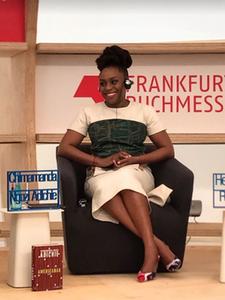 |
|
| Chimamanda Ngozi Adichie at the Frankfurt Book Fair yesterday. | |
"We can no longer play by the old rules of complacency," said Chimamanda Ngozi Adichie, author of Americanah and Half of a Yellow Sun, during the opening press conference of the 2018 Frankfurt Book Fair yesterday morning. "We must invent new ways of doing, new ways of thinking."
Her speech, along with the remarks of Juergen Boos, head of the Frankfurt Book Fair, and Heinrich Riethmueller, president of the German Booksellers and Publishers Association, did not shy away from the tense political climate in the U.S. and around the world as she advocated for diversity, equality and social change.
At a time when the U.S. government resembles an intrigue-filled "feudal court... drowning in its own hubris," Adichie stressed the importance of recognizing the truth, speaking the truth, and especially of calling a lie a lie. She called, too, for more complex stories, saying that now is a time for boldness in storytelling and a time for new storytellers to emerge. "It is important to have a wide diversity of voices, not because we want to be politically correct, but because we want to be accurate," Adichie explained. "We cannot understand the world if we continue to pretend that a small fraction of the world is representative of the whole."
Adichie recalled a time when an editor told her that a scene in one of her books, which she had based almost entirely on a real-life incident, was "completely unbelievable" and seemed "staged" in order to "say something about race." In the moment, Adichie did not protest, as she believed then that a writer couldn't use real life to justify fiction, that if a scene was unbelievable to a reader then the writer had "failed" at their art. But, Adichie noted, she has since started to question that idea.
"What we believe or what we don't believe, what we find believable or we find unbelievable, is itself a framework of our own experiences," she said. "It is time to expand our boundaries, widen the framework, know that what already exists can sometimes be too narrow to fit the complex multiplicity of human experiences."
Adichie reflected, too, on the need for women to speak out about their experiences and the often angry, sometimes violent reactions that occur when they do. She ascribed the phenomenon to a "big gap in the imaginative space of so many people in the world today," calling it an "inability to feel empathy for women, because the stories of women are not truly familiar."
"Their stories are still not really heard," Adichie said. "It is time for us to pay more than just lip service to the fact that women's stories are for everyone."
Adichie pointed out that while she believes that the world needs more overtly political stories, there is also a need for stories that are not overtly political, and she concluded her address with a reflection on the usefulness of literature.
If usefulness ends with the concrete, she said, it may not be. But a human being, she continued, is not a "collection of logical bones and flesh." Humans are "emotional beings as much as we are physical beings," and usefulness should "relate to all of the parts that make us human."
"Our definition of useful is too narrow," she said. "Literature does teach us. Literature does matter." --Alex Mutter

